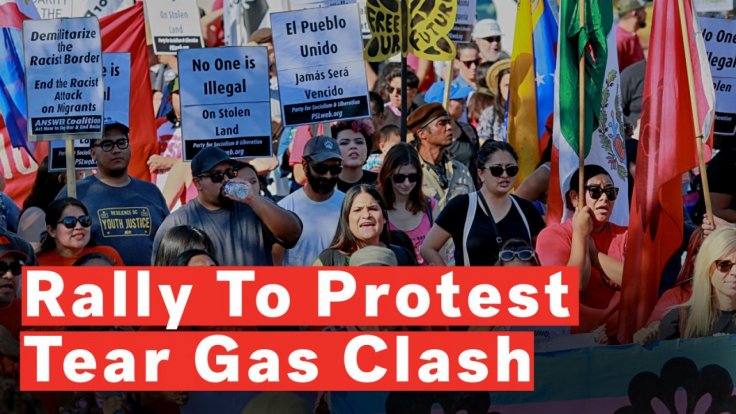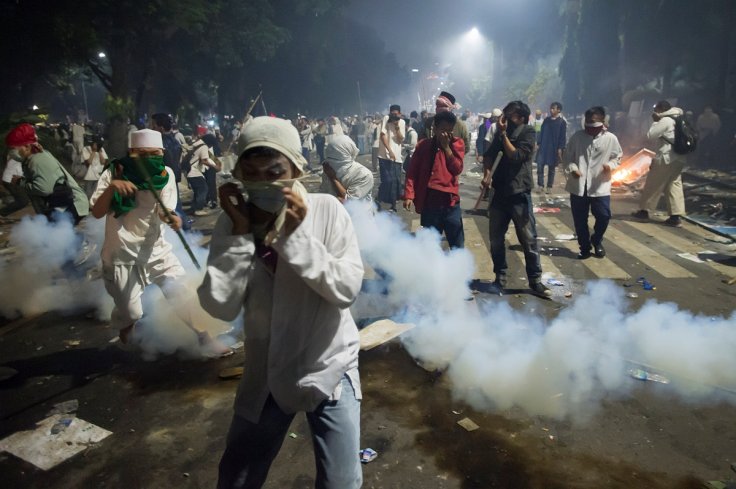The use of tear gas -- particularly CS gas -- as a riot control agent, cannot be reconciled with respect for fundamental human rights and should therefore be banned entirely, says the University of Toronto's International Human Rights Program (IHRP).
In a report released Thursday, the activists urged lawmakers to put forward legislation that bans use of the chemical weapon, eliminating existing stockpiles and prohibiting import, export and manufacture.
The use of tear gas has increasingly become a weapon of choice for policing assemblies from Iran to Hong Kong to the United States. The boom in its use by law enforcement for protests and crowd control has resulted in a corresponding expansion of its use as an area weapon.

Essentially, tear gas is inherently indiscriminate and is frequently abused when deployed against peaceful assemblies, in enclosed spaces, in excessive quantities and against vulnerable populations whether they are the young or the elderly, the healthy or the sick, the peaceful or the violent. It can also cause myriad health harms, including severe injuries and death.
"Tear gas is not a relatively benign method of crowd control. Its deployment effectively crushes the right to freedom of protest and assembly," said Vincent Wong, William C. Research Associate at the IHRP and co-author of the report. "Studies are showing that long-term exposure in the form that we are seeing with protest policing leave those affected at higher risk for a host of illnesses, including contracting respiratory illnesses such as COVID-19."
Legal underpinnings
The report, "The Problematic Legality of Tear Gas Under International Human Rights Law," explores the deficient legal underpinnings and detrimental practical implications of the state of international human-rights law. Although tear gas is banned in warfare under the Chemical Weapons Convention, an exemption for the use of riot control agents for law enforcement purposes was negotiated during the drafting process in order to secure a greater number of ratifying state parties.
Maija Fiorante, IHRP Summer Fellow and co-author, said: "Under international law, any use of force by law-enforcement authorities must abide by the principles of necessity and proportionality, but tear gas is hardly ever used in accordance with such principles."
Since there are no international agreements governing the trade and manufacture of tear gas, the the global market for tear gas is largely unregulated and remained unaccountable, without any common standards for the composition of tear gas. Canisters come in different shapes and sizes and contain an array of toxic chemicals. In many cases, it is difficult to know what combination of chemicals is inside, its level of toxicity, and whether its safety has been tested prior to sale, pointed out the report.

Urging the United Nations and European Union to restrict the use and trade of tear gas, the report said countries should ban exports to other jurisdictions where tear gas is being frequently abused to crack down on protests in a punitive fashion domestically. Regional courts have also made rulings that use of riot-control agents in certain circumstances may violate prohibitions on torture and cruel and inhumane or degrading treatment.
In Canada, MP Matthew Green has sponsored a petition calling for a nationwide ban on the use of tear gas, the destruction of stocks of tear gas currently owned by the police and armed forces, prioritization on de-escalation tactics over dispersal and arrest tactics in crowd control, and an investigation into the May 31, 2020 use of tear gas by police in Montreal on an anti-Black racism demonstration.
"The assumption has always been that tear gas is necessary to avoid use of more lethal weapons," said Natasha Williams, IHRP Summer Fellow and co-author.









